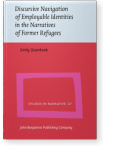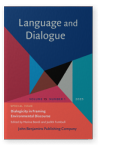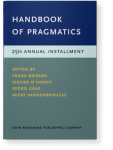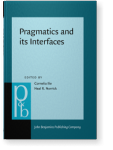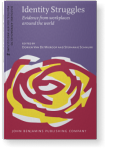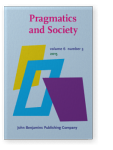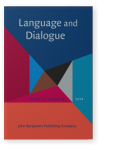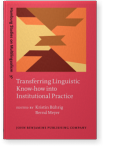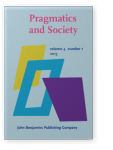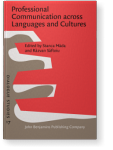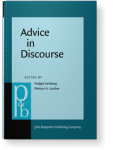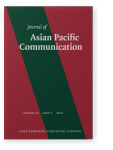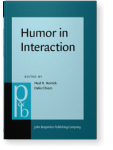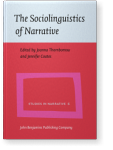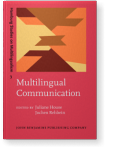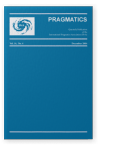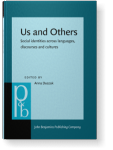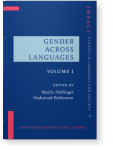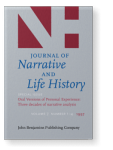Janet Holmes
List of John Benjamins publications for which Janet Holmes plays a role.
Book series
Journal
2022 Workplace interaction Handbook of Pragmatics: 25th Annual Installment, Brisard, Frank, Sigurd D’hondt, Pedro Gras and Mieke Vandenbroucke (eds.), pp. 177–198 | Chapter
2018 Sociolinguistics vs pragmatics: Where does the boundary lie? Pragmatics and its Interfaces, Ilie, Cornelia and Neal R. Norrick (eds.), pp. 11–32 | Chapter
Sociolinguists describe the linguistic resources available in speech communities, and provide a systematic account of how social variables influence linguistic choices from among those resources. Pragmatics explains how individuals use linguistic resources to produce and interpret meaning in… read more
2017 Chapter 7. You’re a proper tradesman mate: Identity struggles and workplace transitions in New Zealand Identity Struggles: Evidence from workplaces around the world, Van De Mieroop, Dorien and Stephanie Schnurr (eds.), pp. 127–146 | Chapter
Using a broad and inclusive definition of what counts as a professional, this paper explores the struggle of developing an appropriate identity as part of the transition from legitimate outsider to workplace insider. Drawing on naturally-occurring data from two contrasting… read more
2015 Doing power and negotiating through disagreement in public meetings Pragmatics and Society 6:3, pp. 444–464 | Article
Power in meetings may be enacted in many ways, ranging from democratic and collaborative through to authoritative and didactic, with the exact positioning on this continuum typically under the control of the chair. By contrast with the focus of most previous research on the behaviour of… read more
2014 Review of Kecskes (2014): Intercultural Pragmatics Language and Dialogue 4:3, pp. 478–486 | Review
2013 Sociolinguistics in New Zealand society: Using research to enhance working lives Transferring Linguistic Know-how into Institutional Practice, Bührig, Kristin and Bernd Meyer (eds.), pp. 21–42 | Article
We make choices about what to study, and about how to use the information we gain from our research. Though we may often wish to just quietly get on with it, we have responsibilities both to our discipline and to the wider community (Holmes 1994: 24).
read more2013 How permeable is the formal-informal boundary at work? An ethnographic account of the role of food in workplace discourse Culinary Linguistics: The chef's special, Gerhardt, Cornelia, Maximiliane Frobenius and Susanne Ley (eds.), pp. 191–210 | Article
Talk about food at work is typically overlooked as peripheral, just like other relationally-oriented discourse (e.g. small talk and humor). Drawing on a data set of workplace interactions recorded in formal and informal settings, we demonstrate how food talk erodes and troubles formality boundaries. read more
2013 Doing listenership: One aspect of sociopragmatic competence at work Pragmatics and Society 4:1, pp. 26–53 | Article
The skills involved in contributing competently in workplace interaction include enacting attentive listenership and providing appropriate feedback to the talk of others. These sociopragmatic skills are often overlooked, and when non-native-like listener feedback does attract attention, cultural… read more
2012 Leadership and intercultural competence at work Professional Communication across Languages and Cultures, Măda, Stanca and Răzvan Săftoiu (eds.), pp. 21–42 | Article
This paper examines the workplace discourse of leaders from different ethnic groups within one country, with some shared and some distinct values and interactional norms. The focus leaders come from professional organisations, one Māori and one Pākehā (European). The leadership performance of the… read more
2012 Chapter 7. Mentoring migrants: Facilitating the transition to the New Zealand workplace Advice in Discourse, Limberg, Holger and Miriam A. Locher (eds.), pp. 145–166 | Chapter
This chapter focuses on face-to-face advice provided to two Chinese male migrants to facilitate the transition from an educational to a workplace context. The migrants are completing a course aimed at helping them develop sociopragmatic competence in New Zealand English and as part of this course… read more
2010 Kia ora matua: Humour and the Maori language in the workplace Journal of Asian Pacific Communication 20:1, pp. 46–68 | Article
Many aspects of the use of the Maori language are highly controversial in New Zealand, and humour is one way in which the sensitivities relating to the language can be negotiated in everyday workplace contexts. This article examines the use of the Maori language by Maori and Pakeha participants… read more
2009 From chairman to chairwoman to chairperson: Exploring the move from sexist usages to gender neutrality Comparative Studies in Australian and New Zealand English: Grammar and beyond, Peters, Pam, Peter Collins and Adam Smith (eds.), pp. 183–204 | Article
This paper analyzes data from written and spoken corpora of British, American, Australian and New Zealand English to track social change in patterns of gender-marking. Frequency data for the use of general terms like woman and man are compared across the different regional varieties of written… read more
2009 Using humor to do masculinity at work Humor in Interaction, Norrick, Neal R. and Delia Chiaro (eds.), pp. 101–124 | Article
Workplaces constitute sites where individuals “do gender” while at the same time constructing their professional identities and meeting their organisation’s expectations. In most workplaces, a rather narrow range of masculine styles of interaction are considered normative. Discursive strategies… read more
2009 Boundary-marking humor: Institutional, gender and ethnic demarcation in the workplace Humor in Interaction, Norrick, Neal R. and Delia Chiaro (eds.), pp. 125–140 | Article
Drawing on recorded workplace meetings of Maori and Pakeha women in one New Zealand government department, this paper illustrates some of the complexities of boundary-marking humor. In particular, we analyse examples where the humor illuminates some of the tensions experienced by less powerful… read more
2005 Socio-pragmatic Aspects of Workplace Talk Linguistic Informatics – State of the Art and the Future: The first international conference on Linguistic Informatics, Kawaguchi, Yuji, Susumu Zaima, Toshihiro Takagaki, Kohji Shibano and Mayumi Usami (eds.), pp. 196–220 | Article
2005 Narrative and the construction of professional identity in the workplace The Sociolinguistics of Narrative, Thornborrow, Joanna and Jennifer Coates (eds.), pp. 193–213 | Article
2004 Strategic code-switching in New Zealand workplaces: Scaffolding, solidarity and identity construction Multilingual Communication, House, Juliane and Jochen Rehbein (eds.), pp. 133–154 | Article
2004 Leadership and managing conflict in meetings Pragmatics 14:4, pp. 439–462 | Article
There is extensive literature describing the characteristics of a good leader in the area of organisational communication and business management. However, the research tends to be based on secondary, survey or reported data, typically interviews and questionnaires. Moreover, the predominant image… read more
2002 Humour as a discursive boundary marker in social interaction Us and Others: Social identities across languages, discourses and cultures, Duszak, Anna † (ed.), pp. 377–400 | Article
2001 English. A corpus-based view of gender in New Zealand Gender Across Languages: The linguistic representation of women and men, Hellinger, Marlis and Hadumod Bußmann (eds.), pp. 115–136 | Article
1.Introduction
2. Sexist language research in New Zealand
2.1 Ms-usage
2.2 Generic man
2.3 Chairpersons and spokespersons
2.4 Morphological marking
2.5 Metaphorical terms of reference
3. Conclusion
Notes
References
2000 11. Talking Maori or Pakeha in English: signalling identity in discourse New Zealand English, Bell, Allan and Koenraad Kuiper (eds.), pp. 249–278 | Article
1999 Women at work: Analysing women’a talk in New Zealand workplaces Australian Review of Applied Linguistics 22:2, pp. 1–17 | Article
Over the last ten years, evidence of gender difference in the use of language has been re-examined from a social constructionist perspective. This approach emphasises the extent to which we actively “perform” or construct aspects of our social identity in interaction with others. Drawing on an… read more
1998 Review of Ken (1998): Hedging in Scientific Research Articles Australian Review of Applied Linguistics 21:2, pp. 144–147 | Review
1997 Setting New Standards: Sound Changes and Gender in New Zealand English English World-Wide 18:1, pp. 107–142 | Article
Social dialect data demonstrates that women tend to lead linguistic change in New Zealand English over a range of linguistic variables. This paper describes some current sound changes in New Zealand English, discusses their potential sources, and suggests possible mechanisms by which they percolate… read more
1994 New Zealand Flappers: An Analysis of T Voicing in New Zealand English English World-Wide 15:2, pp. 195–224 | Article
